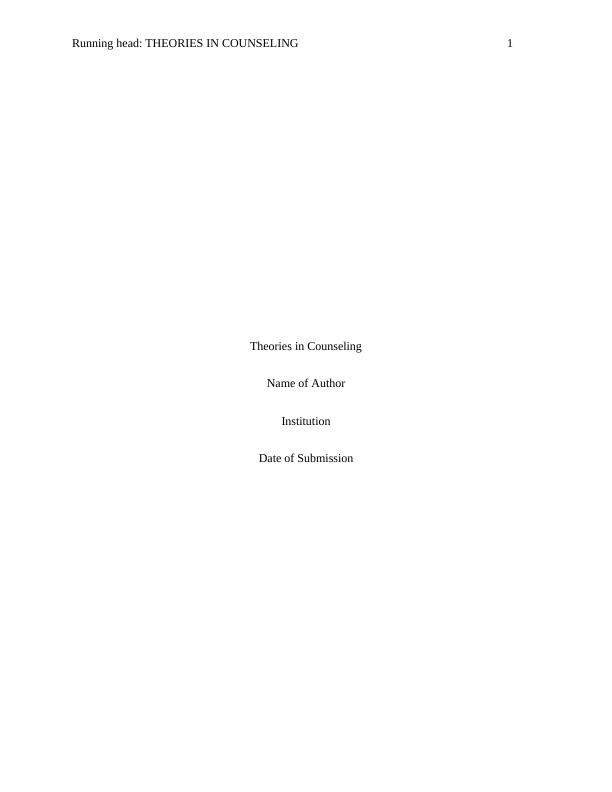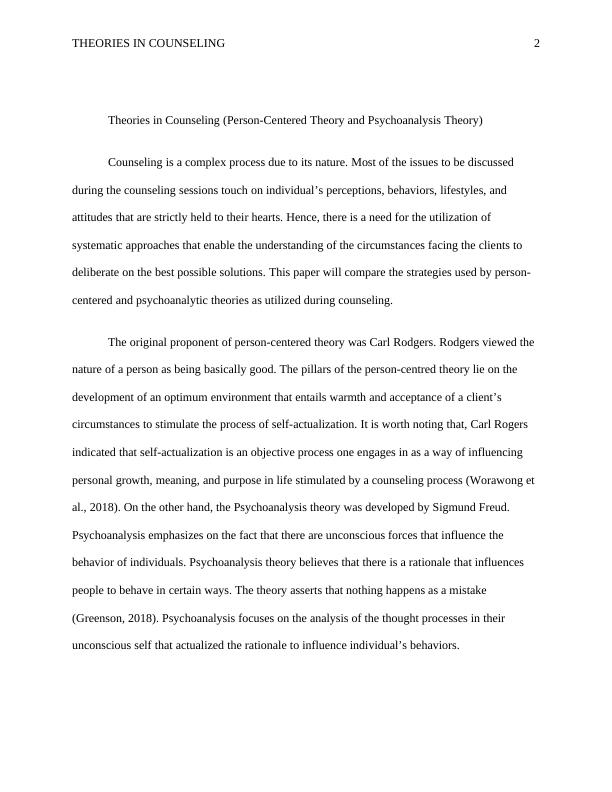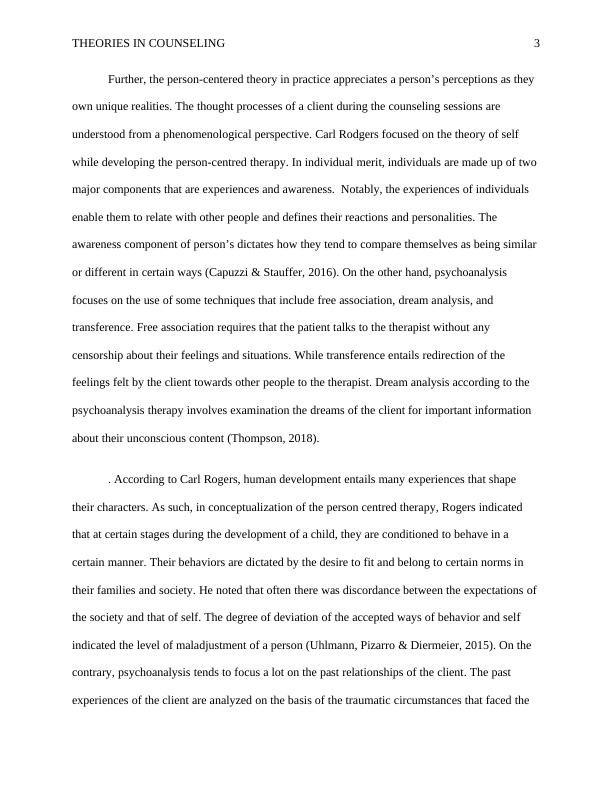Theories in Counseling: Person-Centered Theory and Psychoanalysis Theory
Added on 2022-11-09
7 Pages1399 Words152 Views
Running head: THEORIES IN COUNSELING 1
Theories in Counseling
Name of Author
Institution
Date of Submission
Theories in Counseling
Name of Author
Institution
Date of Submission

THEORIES IN COUNSELING 2
Theories in Counseling (Person-Centered Theory and Psychoanalysis Theory)
Counseling is a complex process due to its nature. Most of the issues to be discussed
during the counseling sessions touch on individual’s perceptions, behaviors, lifestyles, and
attitudes that are strictly held to their hearts. Hence, there is a need for the utilization of
systematic approaches that enable the understanding of the circumstances facing the clients to
deliberate on the best possible solutions. This paper will compare the strategies used by person-
centered and psychoanalytic theories as utilized during counseling.
The original proponent of person-centered theory was Carl Rodgers. Rodgers viewed the
nature of a person as being basically good. The pillars of the person-centred theory lie on the
development of an optimum environment that entails warmth and acceptance of a client’s
circumstances to stimulate the process of self-actualization. It is worth noting that, Carl Rogers
indicated that self-actualization is an objective process one engages in as a way of influencing
personal growth, meaning, and purpose in life stimulated by a counseling process (Worawong et
al., 2018). On the other hand, the Psychoanalysis theory was developed by Sigmund Freud.
Psychoanalysis emphasizes on the fact that there are unconscious forces that influence the
behavior of individuals. Psychoanalysis theory believes that there is a rationale that influences
people to behave in certain ways. The theory asserts that nothing happens as a mistake
(Greenson, 2018). Psychoanalysis focuses on the analysis of the thought processes in their
unconscious self that actualized the rationale to influence individual’s behaviors.
Theories in Counseling (Person-Centered Theory and Psychoanalysis Theory)
Counseling is a complex process due to its nature. Most of the issues to be discussed
during the counseling sessions touch on individual’s perceptions, behaviors, lifestyles, and
attitudes that are strictly held to their hearts. Hence, there is a need for the utilization of
systematic approaches that enable the understanding of the circumstances facing the clients to
deliberate on the best possible solutions. This paper will compare the strategies used by person-
centered and psychoanalytic theories as utilized during counseling.
The original proponent of person-centered theory was Carl Rodgers. Rodgers viewed the
nature of a person as being basically good. The pillars of the person-centred theory lie on the
development of an optimum environment that entails warmth and acceptance of a client’s
circumstances to stimulate the process of self-actualization. It is worth noting that, Carl Rogers
indicated that self-actualization is an objective process one engages in as a way of influencing
personal growth, meaning, and purpose in life stimulated by a counseling process (Worawong et
al., 2018). On the other hand, the Psychoanalysis theory was developed by Sigmund Freud.
Psychoanalysis emphasizes on the fact that there are unconscious forces that influence the
behavior of individuals. Psychoanalysis theory believes that there is a rationale that influences
people to behave in certain ways. The theory asserts that nothing happens as a mistake
(Greenson, 2018). Psychoanalysis focuses on the analysis of the thought processes in their
unconscious self that actualized the rationale to influence individual’s behaviors.

THEORIES IN COUNSELING 3
Further, the person-centered theory in practice appreciates a person’s perceptions as they
own unique realities. The thought processes of a client during the counseling sessions are
understood from a phenomenological perspective. Carl Rodgers focused on the theory of self
while developing the person-centred therapy. In individual merit, individuals are made up of two
major components that are experiences and awareness. Notably, the experiences of individuals
enable them to relate with other people and defines their reactions and personalities. The
awareness component of person’s dictates how they tend to compare themselves as being similar
or different in certain ways (Capuzzi & Stauffer, 2016). On the other hand, psychoanalysis
focuses on the use of some techniques that include free association, dream analysis, and
transference. Free association requires that the patient talks to the therapist without any
censorship about their feelings and situations. While transference entails redirection of the
feelings felt by the client towards other people to the therapist. Dream analysis according to the
psychoanalysis therapy involves examination the dreams of the client for important information
about their unconscious content (Thompson, 2018).
. According to Carl Rogers, human development entails many experiences that shape
their characters. As such, in conceptualization of the person centred therapy, Rogers indicated
that at certain stages during the development of a child, they are conditioned to behave in a
certain manner. Their behaviors are dictated by the desire to fit and belong to certain norms in
their families and society. He noted that often there was discordance between the expectations of
the society and that of self. The degree of deviation of the accepted ways of behavior and self
indicated the level of maladjustment of a person (Uhlmann, Pizarro & Diermeier, 2015). On the
contrary, psychoanalysis tends to focus a lot on the past relationships of the client. The past
experiences of the client are analyzed on the basis of the traumatic circumstances that faced the
Further, the person-centered theory in practice appreciates a person’s perceptions as they
own unique realities. The thought processes of a client during the counseling sessions are
understood from a phenomenological perspective. Carl Rodgers focused on the theory of self
while developing the person-centred therapy. In individual merit, individuals are made up of two
major components that are experiences and awareness. Notably, the experiences of individuals
enable them to relate with other people and defines their reactions and personalities. The
awareness component of person’s dictates how they tend to compare themselves as being similar
or different in certain ways (Capuzzi & Stauffer, 2016). On the other hand, psychoanalysis
focuses on the use of some techniques that include free association, dream analysis, and
transference. Free association requires that the patient talks to the therapist without any
censorship about their feelings and situations. While transference entails redirection of the
feelings felt by the client towards other people to the therapist. Dream analysis according to the
psychoanalysis therapy involves examination the dreams of the client for important information
about their unconscious content (Thompson, 2018).
. According to Carl Rogers, human development entails many experiences that shape
their characters. As such, in conceptualization of the person centred therapy, Rogers indicated
that at certain stages during the development of a child, they are conditioned to behave in a
certain manner. Their behaviors are dictated by the desire to fit and belong to certain norms in
their families and society. He noted that often there was discordance between the expectations of
the society and that of self. The degree of deviation of the accepted ways of behavior and self
indicated the level of maladjustment of a person (Uhlmann, Pizarro & Diermeier, 2015). On the
contrary, psychoanalysis tends to focus a lot on the past relationships of the client. The past
experiences of the client are analyzed on the basis of the traumatic circumstances that faced the

End of preview
Want to access all the pages? Upload your documents or become a member.
Related Documents
Comparative Essay On Psychoanalytic Therapy and Person-Centered Therapylg...
|7
|1767
|76
Theory of Counseling and Psychotherapylg...
|15
|4430
|348
Theories of Counsellinglg...
|10
|2576
|1
Contemporary Humanistic Counselling Theorylg...
|7
|1923
|476
The most famous American psychologistslg...
|7
|1463
|11
Psychology Personal Development activitieslg...
|7
|1631
|10
